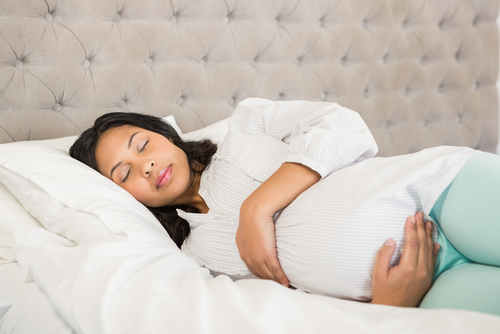Why Sleep Apnea Matters During Pregnancy
Pregnancy is a beautiful time in a woman’s life, but it comes with its own set of challenges. One often overlooked issue that can affect pregnant women is sleep apnea. While it may seem like a condition that only affects those with other health issues, sleep apnea can have a significant impact on both the mother and baby.
As you navigate your pregnancy journey, Windsor, CT sleep specialist, Dr. Roberta Garceau can help you recognize the symptoms and risks associated with this condition. Addressing sleep apnea early on is essential not only for your well-being but also for the health of your baby. If you’re in Windsor, Hartford, Enfield or nearby areas, contact Dr. Garceau by calling (860) 254-6189 to manage this condition during pregnancy.

Signs and Symptoms of Sleep Apnea During Pregnancy
Identifying sleep apnea during pregnancy can be tricky, especially since many of the symptoms overlap with common pregnancy issues, such as fatigue or frequent nighttime awakenings. However, there are key signs to look out for:
- Loud Snoring: While snoring isn’t always a sign of sleep apnea, loud, frequent snoring that’s interrupted by periods of silence (followed by gasping for air) can be a red flag.
- Daytime Fatigue: Feeling unusually tired or drowsy during the day, even after a full night’s sleep, can indicate that you’re not getting quality rest due to interruptions in your breathing.
- Shortness of Breath During Sleep: If you wake up gasping for air or feel out of breath at night, it could be a symptom of obstructive sleep apnea.
- Frequent Nighttime Awakenings: Constantly waking up throughout the night, especially feeling restless, can disrupt your sleep cycle, which could be a sign of sleep apnea.
- Headaches in the Morning: Morning headaches are common in pregnant women, but if you experience them along with other symptoms, sleep apnea may be a factor.
How Sleep Apnea Affects Pregnancy and Your Baby
While sleep apnea is already dangerous for adults, it can have additional risks when combined with pregnancy. Here are some ways sleep apnea can affect both the mother and the baby:
Increased Risk of High Blood Pressure
Pregnant women are already at a higher risk for developing high blood pressure or even preeclampsia (a condition characterized by high blood pressure and organ damage). Sleep apnea can contribute to this risk by reducing oxygen levels in the blood, which puts strain on the cardiovascular system. It can also lead to increased inflammation in the body, further elevating blood pressure.
Gestational Diabetes
Sleep apnea during pregnancy has been linked to a higher risk of developing gestational diabetes. Poor sleep quality and interruptions in oxygen levels can affect insulin regulation, leading to higher blood sugar levels. Gestational diabetes can be harmful to both the mother and the baby, potentially causing complications during birth.
Preterm Birth and Low Birth Weight
Studies show that untreated sleep apnea during pregnancy is associated with an increased risk of preterm labor and low birth weight. The reduced oxygen supply caused by sleep apnea can affect fetal development, leading to complications during pregnancy.
Complications During Delivery
Sleep apnea can lead to complications during labor and delivery, including difficulty with anesthesia management, increased risk of a cesarean section, and even longer recovery times after birth. These complications can put both the mother and baby at risk.
Diagnosis: How Do You Know If You Have Sleep Apnea?
If you suspect you may have sleep apnea, it’s essential to seek professional help. Dr. Garceau is trained to diagnose sleep apnea through a variety of methods.
The first step is typically a sleep study. This can be done at a sleep center or even in the comfort of your home using a portable device that monitors your breathing patterns while you sleep. The results will show how often your breathing stops and starts throughout the night, helping the doctor determine if you have sleep apnea and the severity of your condition.

Treatment Options for Sleep Apnea During Pregnancy
Treating sleep apnea during pregnancy is crucial for the health of both the mother and baby. There are several options available, depending on the severity of the condition:
Lifestyle Changes
Making simple changes to your sleep routine can help alleviate mild symptoms of sleep apnea. For example:
- Sleeping on your side instead of your back can prevent your airway from becoming blocked.
- Weight management can reduce the severity of sleep apnea, though this can be challenging during pregnancy. However, maintaining a healthy weight through diet and exercise can help manage symptoms.
CPAP Therapy
For moderate to severe sleep apnea, a Continuous Positive Airway Pressure (CPAP) machine is often used. This device uses a mask to deliver a steady stream of air to keep your airway open while you sleep. While CPAP is a highly effective treatment, it may be uncomfortable at first, so working closely with a sleep specialist like Dr. Garceau in Windsor, CT, can help you adjust the settings for a more comfortable fit.
Oral Appliances
An oral appliance or mandibular advancement device (MAD) is another option that can be used to treat sleep apnea. This device is designed to reposition your lower jaw slightly forward, which helps keep the airway open during sleep. It’s particularly helpful for people with mild to moderate sleep apnea.
Surgery (in Rare Cases)
In rare cases, surgery for sleep apnea may be recommended if other treatments are unsuccessful. This could involve removing excess tissue from the throat to prevent airway blockage. However, surgery is typically not the first choice for pregnant women due to potential risks.
Why You Should Consult a Sleep Specialist
Managing sleep apnea during pregnancy is essential for both your well-being and the health of your baby. Dr. Garceau, a highly regarded sleep specialist in Windsor, CT, is trained to diagnose and treat sleep apnea in pregnant women. She can guide you through the process of understanding your symptoms and finding the best treatment plan that suits your unique needs.
By addressing sleep apnea early, you can minimize the risks associated with this condition and enjoy a healthier, more restful pregnancy. Whether you’re located in Windsor, Hartford, or Enfield, seeking care from a trusted sleep specialist can help ensure the best possible outcome for both you and your baby.
Frequently Asked Questions
Taking Control of Your Sleep Health During Pregnancy
Sleep apnea may be a common condition, but it should not be ignored—especially during pregnancy. The risks it poses to both the mother and baby are serious, and finding the right treatment can make all the difference.
If you’re pregnant and suspect you might have sleep apnea, don’t hesitate to reach out to your Windsor sleep specialist by calling (860) 254-6189. She can guide you through the process of diagnosis and treatment, ensuring a healthier pregnancy for both you and your baby.
By addressing sleep apnea early, you can ensure that your pregnancy is as safe and enjoyable as possible, with better sleep, more energy, and improved overall health. Take control of your sleep health today and enjoy a better tomorrow.
